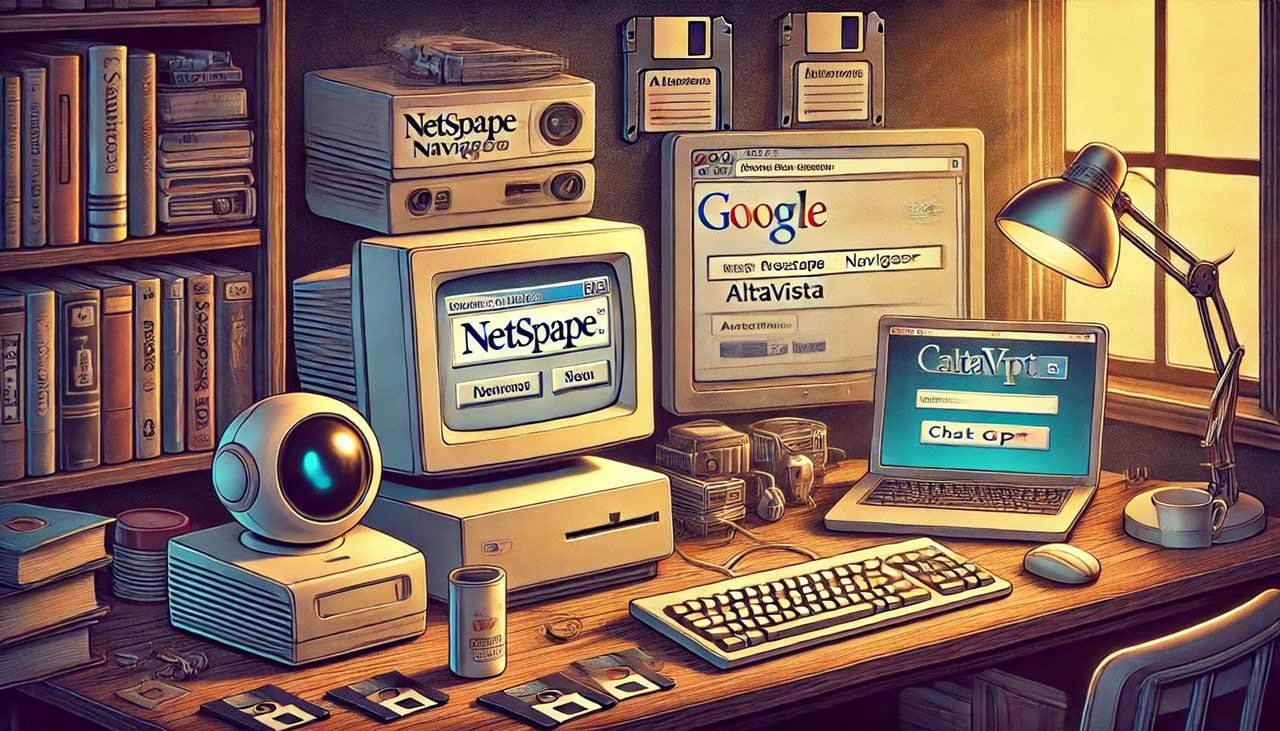Art Blog #85: How Searching on ChatGPT Differs from Searching on Google
19. November, 2024 - Reading time 8 Min.
#InternetSearch #HistoryOfInternetSearch #HistoryOfGoogle #ChatGPT #EvolutionOfInternet
In the early days of the internet, finding information was a challenge. The first browsers, such as Netscape Navigator in the 1990s, were revolutionary in providing graphical interfaces for navigating the web.
A Brief History of Searching on the Internet
In the early days of the internet, finding information was a challenge. The first browsers, such as Netscape Navigator in the 1990s, were revolutionary in providing graphical interfaces for navigating the web. Alongside these, search engines like AltaVista, Lycos, and Ask Jeeves emerged, offering rudimentary methods to search the web. These early tools used keyword matching and basic algorithms to index web pages, but they often delivered inconsistent or irrelevant results.
Then came Google in 1998, and it transformed the way we search. Google introduced the PageRank algorithm, prioritizing results based on the relevance and quality of content, as determined by links between websites. This made search results far more accurate, efficient, and user-friendly. Over time, Google became synonymous with internet search, adding features like predictive text, personalized suggestions, and natural language processing. However, its approach still fundamentally relies on providing lists of links for users to sift through.
ChatGPT: A Revolutionary Approach to Information Search
The introduction of AI-powered conversational models, like ChatGPT, marks a paradigm shift in how we interact with and retrieve information. Rather than merely indexing and linking to websites, ChatGPT uses advanced natural language understanding to provide contextual, conversational, and synthesized answers.
How ChatGPT Navigates Data
1. Natural Language Understanding
Unlike traditional search engines, ChatGPT understands questions in conversational language, making it easier for users to phrase queries naturally without worrying about keywords or search syntax.
2. Synthesized Responses
ChatGPT doesn’t just list links; it compiles and presents the most relevant information in a cohesive and concise format, saving users time and effort.
3. Interactive Learning
Users can follow up with more detailed questions, refine their search, or explore tangential topics without starting over. This dynamic interaction fosters deeper engagement with information.
4. Personalization
ChatGPT can tailor responses based on specific user needs, whether someone is looking for a quick answer, a professional overview, or creative inspiration.
Benefits for Individuals and Professionals
- For Individuals: ChatGPT serves as an efficient and user-friendly assistant for answering everyday questions, learning new skills, and even solving technical problems. For example, a student can use it to grasp complex concepts, while a hobbyist can explore creative ideas seamlessly.
-For Professionals: ChatGPT is a versatile tool for generating reports, brainstorming content, and simplifying complex data analysis. A marketer might use it to create compelling copy, while an engineer can seek explanations for technical topics or even code snippets.
Comparing the Evolution of Internet Search
The journey of internet search mirrors humanity's relentless pursuit of efficiency and innovation:
1990s: Search engines like AltaVista and Lycos offered a rudimentary way to sift through the web, focusing on basic keyword matches.
2000s: Google revolutionized search with PageRank, creating an era of precise, link-based search results.
2020s: AI models like ChatGPT introduce a conversational and intuitive approach to accessing information, focusing on usability and synthesis over navigation.
Each step in this evolution made accessing knowledge faster, simpler, and more powerful. While Google excels in offering a vast array of resources for comprehensive searches, ChatGPT brings intelligent, immediate insights, tailored to specific user contexts. Together, they represent the best of what the internet can offer: structured exploration and creative problem-solving.
In the ever-evolving landscape of digital search, ChatGPT complements traditional engines, signaling a future where interacting with information becomes not just easier, but also more meaningful.
End





